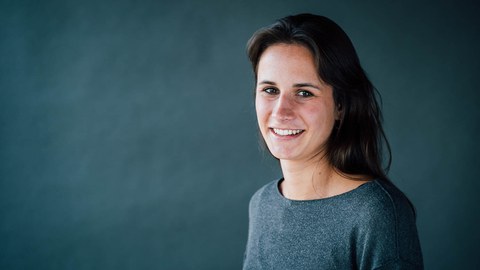Jan 20, 2022
CMCB Graduate Awarded 2021 Georg-Helm Prize for Outstanding Master’s Thesis

Paula Santos Otte
TU Dresden has awarded the 2021 Georg-Helm Prize for outstanding Master’s thesis to Paula Santos Otte for her work in the Diez Group at the B CUBE – Center for Molecular Bioengineering.
There are tiny cellular machines that can bind and walk the filaments that make up the skeleton of all the cells within our body. The first time Paula Santos Otte heard about this, she was immediately fascinated. “What was particularly captivating was the cytoskeleton itself, a huge network of filaments that give shape to the cell. Microtubules are one of three types of these dynamic filaments. Microtubules consist of many repetitions of small building blocks (tubulin) and are constantly being assembled and disassembled. There is a multitude of proteins that travel along these filaments, support various processes in our body, and regulate the microtubule length” says Paula.
In the final year of her Nanobiophysics studies at the Center for Molecular and Cellular Bioengineering (CMCB), Paula joined the group of Prof. Stefan Diez at the B CUBE to work on microtubules and some of their associated proteins in the course of her Master’s thesis. Her work focused on spastin, a microtubule severing enzyme that binds microtubules and generates internal breaks in their lattice, a process also known as severing.
“I found that spastin is able to regulate the microtubule length in two distinct ways. On the one hand, as it had been previously shown by other labs, spastin can sever a microtubule along its length by generating internal breaks in its lattice. On the other hand, I found that it can depolymerize/disassemble microtubules from their ends, which had never been observed for this enzyme,” says Paula Santos Otte. “Paula was able to show that the effect depends on the concentrations of spastin and free tubulin as well as the concentration of the energy-carrying ATP. Very intriguingly, spastin severed the microtubules more often at sites which already had defects,” adds Dr. Cordula Reuther who directly supervised Paula’s thesis work in the Diez Group.
In addition, Paula was significantly involved in setting up laboratory conditions that allowed the multiplication of microtubules with constant length by constantly fragmenting and regrowing them. These results, which are just being published in the renowned interdisciplinary scientific journal "Nano Letters" could prove valuable for a variety of nanotechnological applications, for example when microtubules driven by molecular motors are used to perform computational tasks.
Paula completed her thesis despite the challenging situation of ongoing restrictions due to the COVID-19 pandemic. “I am very pleased and satisfied knowing that all the work, time, and effort that I put into my Master’s thesis was now acknowledged by the prize committee,” says Paula. “Receiving this award has provided me with a lot of motivation to continue scientific work and to start a Ph.D.,” she concludes.
“It was a great pleasure to host Paula in our lab and support her during the project. I am very happy to see Paula’s work being rewarded with the Georg-Helm Prize. I am positive that Paula has a bright scientific career ahead of her,” adds Prof. Stefan Diez, research group leader at B CUBE.
The Georg-Helm Prize was established in 1995 by the Verein zur Förderung von Studierenden der Technischen Universität Dresden e.V. The prize is awarded annually for outstanding doctoral, master's, and diploma theses. The winners receive a prize of 2,500 euros and a medal made of Meissen porcelain.
